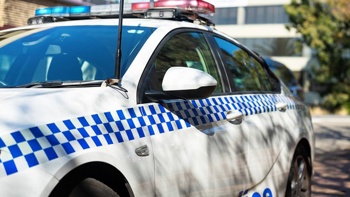Ami Dhabuwala has been freedom camping around Aotearoa with her partner for more than two months, but she’s never witnessed bad campers. When she heard about freedom campers defecating in public, she was shocked.
According to an RNZ report, freedom campers were spotted by a local scout group defecating, urinating and littering around the West End Road carpark in Auckland’s affluent Herne Bay suburb.
“We have stayed in quite a few freedom camping sites and we have never seen or experienced such horrible acts,” Dhabuwala, 34, told the Herald.
Referring to a recent stay at a site in Napier, the former Auckland-based operations manager turned content creator said they “never once felt that we were unwanted. [The residents] were happy to have us there.”
Sagar Patel and Ami Dhabuwala inside their van while on the road in Marlborough.
Freedom camping has deep roots in New Zealand. The country has some of the most breathtaking and dramatic landscapes on earth, pulling many visitors and locals closer to nature. But lately, some popular hot spots are not as relaxing.
In Queenstown, the nation’s most popular freedom camping destination, an increase in bad-behaved freedom campers has pushed the Queenstown Lakes District Council (QLDC) to implement new measures. Taking effect on December 1, the Freedom Camping Bylaw 2025 permits freedom camping in only 15 specified restricted areas, which are subject to specific conditions.
Speaking to the Herald, Queenstown Mayor John Glover said the bylaw provides “some degree of control” over the impacts of the volume of freedom camping in the community.
He described three key elements separating the types of freedom campers in New Zealand. According to Glover, the majority are responsible Kiwis who own their own motorhome, likely part of the New Zealand Motor Caravan Association and “understand sensitivities”. Then there are the visitors who want to do the right thing but may not understand culturally or behaviourally what is acceptable camping behaviour in NZ.
“And then we’ll have ... people for whom the most important thing about freedom camping is the word free,” said Glover. “That’s probably the sector that has had the most impact on our local communities.”

Queenstown Lakes District Mayor John Glover. Photo / QLDC
Glover said he has personally witnessed “behaviours that wouldn’t normally be acceptable” such as littering, open fires on private land, people sneaking into hostels to take showers, hanging out the washing on someone’s fence and urinating in public.
“And I’ve had people who just walk into my own business premises, using the toilets, washing their dishes in the sink. I still struggle to understand where that expectation comes from that people [think] they can do that,” Glover added.
Last summer, Glover said a residential street in the district had up to 80 vehicles parked on it. People were camping out in the back of their van with no outdoor toilets nearby.
Glover said the new bylaw would not only prevent a similar situation, but also help to ensure freedom campers have access to toilets off the road, and prevent obstruction.
In Wānaka, residents are campaigning to stop freedom camping at Beacon Point, a popular spot drawing visitors for its panoramic views of Lake Wānaka and the Southern Alps, where the new bylaw permits freedom camping sites.
On October 28, Save Clean New Zealand launched a petition via change.com to call on QLDC to withdraw Beacon Point from its bylaw.
At the time of writing, the petition has gathered nearly 1000 signatures.
“This is not about opposing freedom camping, it’s about getting it right,” read the petition description.
Some freedom campers disagree that fulltime campers are the cause of the issue.
“It’s not the freedom campers leaving the trash behind - it’s the day visitors,” wrote one user in the popular Free Camping in New Zealand public Facebook group.
In response, Glover clarified the bylaw is about “people who choose to use their vehicles to sleep in public areas and to play some controls around that,” he said. “Day trippers, we’d love to have you. You’re always welcome.”
The Freedom Camping Act 2011 permits freedom camping in New Zealand, but councils can introduce bylaws and restrict or ban camping in specific areas to protect the environment, the health and safety of people who may visit the area, and access.
On freedom camping etiquette, Dhabuwala has straightforward advice on showing respect to the environment and neighbours.

Auckland couple Sagar and Ami have been travelling around New Zealand in their van since September.
“First of all, be grateful that we have been given this opportunity to even do this. Freedom camping and paying zero dollars in New Zealand - it’s a blessing,” she said.
“Know that you are sharing a space with a neighbour ... be mindful that someone is living out there or someone working out there. What would you do at your home? Just treat it like your home.
“You wouldn’t pee in your garden, right? So, the same rule applies to the freedom camping sites. Be respectful.”
Varsha Anjali is a journalist in the lifestyle team at the Herald. Based in Auckland, she covers travel, culture and more.
Take your Radio, Podcasts and Music with you









